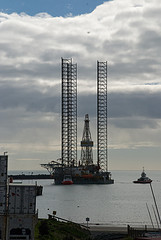
Late in the Bush administration, the president lifted an executive order banning offshore drilling. A few months later, facing skyrocketing gas prices, Congress allowed a congressional moratorium, dating back to 1982, to lapse. Offshore drilling has been blatantly polarizing national politics ever since.
In mid-February, the Obama administration road blocked the new offshore drilling plans initiated by their predecessors. They did not ban the practice outright, but they did delay final decisions until at least the fall, giving state governments, oil companies, environmental groups, and any other interested parties time to weigh in on the controversy. Ken Salazar, the Secretary of the Interior, also ordered his department to report on alternative energies, such as wind and wave power, available on the Continental Shelf, citing that the Bush administration had ignored such alternatives and based their decision on information 20 to 30 years old.
Virginia Governor Tim Kaine was quick to request the Department of the Interior delay the leasing of any land off his state’s coastline for the purposes of offshore drilling. The Virginia coastline was part of the area protected by the now lapsed bans, an area including much of the Atlantic and Pacific coasts as well as large portions of the Outer Continental Shelf. Currently, offshore drilling is only allowed in the Gulf of Mexico and off the coast of Alaska.
Wednesday, executives from several major oil companies, including BP America, ExxonMobil, and Shell Oil, met with Congress to push for the expansion of offshore drilling. They pointed out that despite growing green energy alternatives, the U.S. currently imports 65 percent of the oil and natural gas it consumes every year. They also pointed to government studies that estimated the untouched regions could contain around 17.8 billion barrels of oil and 76 trillion cubic feet of natural gas, a great boon for energy independence as well as national security.
Environmental organizations are vehemently opposed to any increase in offshore drilling, citing the possibility of future oil spills and their subsequent devastation to marine life. President Obama has only said that he might support some increase in offshore drilling as a part of a larger U.S. energy plan. No doubt, the debate will continue to rage.
Photo Credit: PhillipC at flickr






Folks – let’s keep in mind the following…
• Oil companies PAY the federal and state governments for the privilege of drilling offshore. That’s money going into the tax base that YOU don’t have to pay. The government uses those funds to build schools, roads and hospitals.
• Offshore drilling creates a huge number of high paying blue collar and white collar jobs. So YOU don’t have to pay for their unemployment benefits and they pay income taxes that eventually benefit you. Those same folks will be spending lots of money and buying lots of homes shore side.
• Economics 101 indicates that more supply = lower prices for the oil and natural gas that offshore drilling produces.
• More supply sourced domestically helps to insure that we have a more stable source of supply. This lowers the risk of being “cut off” by others. For the oil and gas market, this then psychologically serves to reduce the price of oil and gas and such will be reflected in how the commodity is priced.
• Offshore drilling is proven safe and clean. Probably much safer than the oil tankers that cruise in and out of the nations harbors daily.
So it’s no skin off your nose if the oil companies want to drill for oil. In fact, it benefits you directly and indirectly. It’s time that we get behind this for the good of the nation and the economy.
Folks – let’s keep in mind the following…
• Oil companies PAY the federal and state governments for the privilege of drilling offshore. That’s money going into the tax base that YOU don’t have to pay. The government uses those funds to build schools, roads and hospitals.
• Offshore drilling creates a huge number of high paying blue collar and white collar jobs. So YOU don’t have to pay for their unemployment benefits and they pay income taxes that eventually benefit you. Those same folks will be spending lots of money and buying lots of homes shore side.
• Economics 101 indicates that more supply = lower prices for the oil and natural gas that offshore drilling produces.
• More supply sourced domestically helps to insure that we have a more stable source of supply. This lowers the risk of being “cut off” by others. For the oil and gas market, this then psychologically serves to reduce the price of oil and gas and such will be reflected in how the commodity is priced.
• Offshore drilling is proven safe and clean. Probably much safer than the oil tankers that cruise in and out of the nations harbors daily.
So it’s no skin off your nose if the oil companies want to drill for oil. In fact, it benefits you directly and indirectly. It’s time that we get behind this for the good of the nation and the economy.